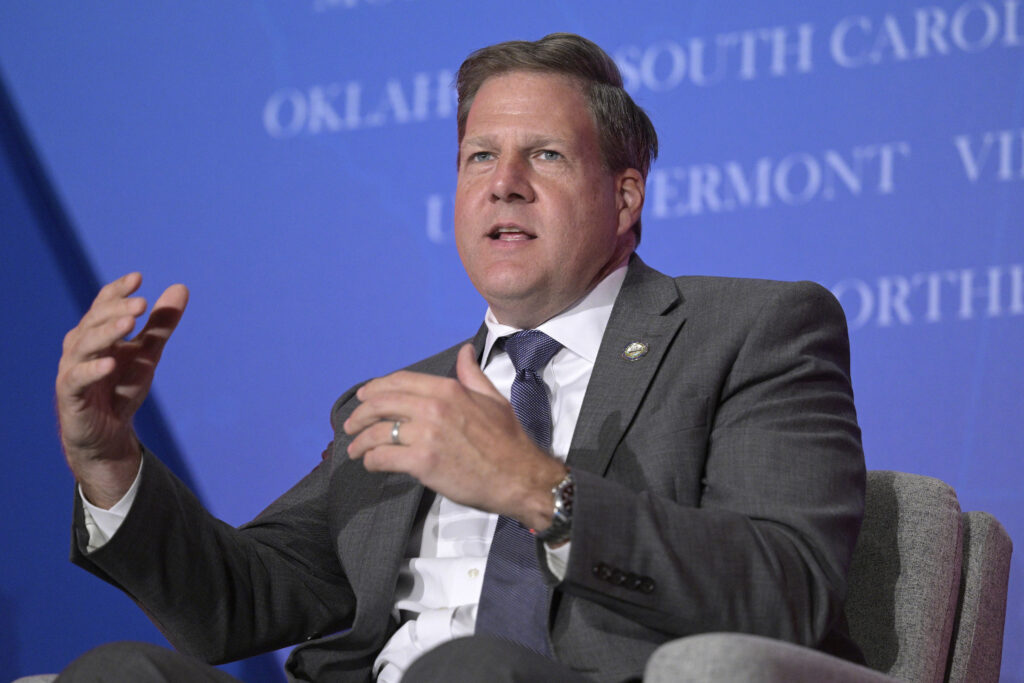New Hampshire Governor Signs Law Requiring Voter ID and Proof of Citizenship

New Hampshire Gov. Chris Sununu (R) signed a bill into law on Thursday that will require voters to present photo IDs and proof of citizenship, but it will not take effect until after the 2024 election.
House Bill 1569 was passed by New Hampshire’s Republican-controlled legislature back in May. People registering to vote on Election Day can no longer cast a ballot without having a valid form of photo identification, like a driver’s license, or citizenship documents, like a birth certificate or passport.
After the bill was in limbo for four months, Sununu signed it 54 days before the election. However, the law won’t impact voters this year, since it won’t take effect until 60 days after passage.
State Rep. Angela Brennan (D) said Thursday there is bipartisan opposition to this bill.
“This bill HB1569, now signed into law, is unconstitutional and don’t just take my word for it— Republican Senator Jim Gray said so as well,” Brennan wrote in a post on X. “Expect extensive and expensive lawsuits on NH taxpayers’ dime. Thanks, NHGOP.”
Original post, May 24
WASHINGTON, D.C. — New Hampshire’s Republican-controlled House of Representatives and Senate passed a bill on Thursday that would eliminate exceptions to the state’s voter identification requirement.
Under the status quo, if a voter doesn’t have a valid form of photo identification, but an election official or town/city clerk can verify that person’s identity, then they can cast a ballot.
The secretary of state provides training for election officials who manage voter checklists on how to use “nonpublic data in the statewide centralized voter registration database” to satisfy voter ID requirements, according to a state election law.
House Bill 1569 would no longer allow this exemption to the state’s voter ID to exist. It would also no longer allow election officials to accept affidavits as proof of identity or citizenship — and it repeals any procedures in place regarding affidavit ballots.
Under current law, voters registering on election day without an approved photo ID — like a driver’s license or passport — can vote if they sign an affidavit confirming their identity, which is a written statement signed under oath. If it is proven to be false, it would be considered perjury under the law. Then, they can cast an affidavit ballot.
Additionally, if a voter arrives at the polls without an acceptable proof of age, residence or citizenship document — like a passport or birth certificate — they can complete a voter affidavit confirming that they are a U.S. citizen and cast a regular ballot. Under both of these circumstances, the ballots can be challenged.
The League of Women Voters of New Hampshire said on its website that H.B. 1569 “would make voter registration much more difficult for people without all their documents at hand,” and the organization considers it a voter suppression bill.
H.B. 1569 has been sent to Gov. Chris Sununu’s (R) desk, and there is a similar election bill currently being considered by the state legislature.
House Bill 1370, which was amended in the Senate and is now being considered in the House, is extremely similar to H.B. 1569. However, there’s a key difference: it creates a process to verify voter information with state agencies as an alternative to providing photo ID on election day. State Sen. James Gray (R) said that this is a “better bill” than H.B. 1569.
In practice, however, this process to allow people to register to vote may not help many voters, since it’s likely that the voters who don’t have photo ID or proof of citizenship will not have the necessary information in the databases either.
“Despite our current system working, H.B. 1370 as amended would create a complicated and burdensome ‘hotline’ process for election officials to use, a process that could drastically increase wait times for voter registration and still turn away eligible voters without documents,” McKenzie St. Germain, Campaign Director for the New Hampshire Campaign for Voting Rights, said in a statement.
If either of these bills passed and signed by Sununu, they could prevent numerous people from voting in the 2024 election.